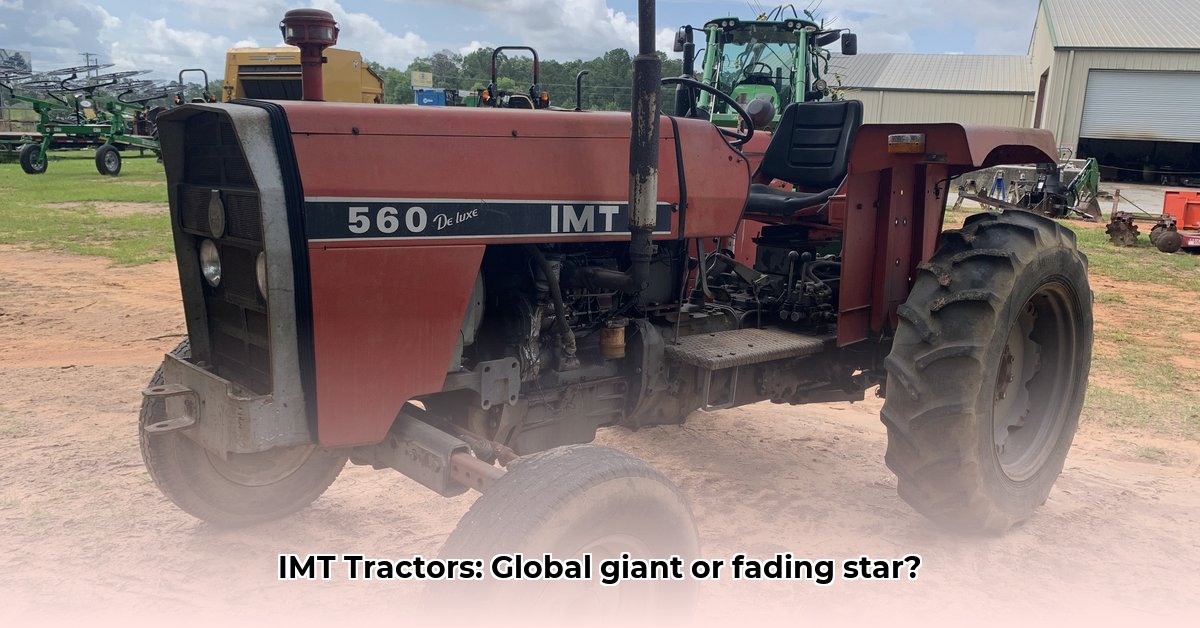
A Case Study in Agricultural Equipment Consolidation
IMT tractors, a Balkan farming stalwart since 1947, faced mounting challenges in the 2010s. Global competition and economic headwinds pushed the company to the brink. However, a strategic acquisition by TAFE, a major Indian agricultural machinery manufacturer, in 2018, offered a lifeline. For more information on IMT's history, visit the IMT website. This case study analyzes the integration, challenges, opportunities, and future prospects of this global agricultural consolidation effort.
The Acquisition and Integration of IMT Tractors by TAFE
TAFE's acquisition of IMT was a calculated move, leveraging IMT's regional strength and brand recognition to expand TAFE's global reach. The immediate benefit was access to IMT's established dealer network across the Balkans. But integrating two companies with distinct cultures and operational methodologies proved complex. Harmonizing production processes, technology, and even workplace culture presented significant challenges. How did TAFE approach this integration? What were the initial hurdles? The success of this merger hinged upon the effective management of these integration challenges. Did TAFE have a comprehensive plan in place to manage these complexities, and how successful has that plan been?
Navigating the Challenges: Risk Assessment and Mitigation
A key aspect of the post-acquisition strategy involved a thorough risk assessment. This risk assessment identified key challenges and proposed mitigation strategies. The risk assessment matrix highlighted several crucial areas needing attention: integration difficulties, competition, international regulatory compliance, supply chain disruptions, and technological obsolescence. Each of these risks posed a significant potential impact on the success of the acquisition. The mitigation strategies proposed included phased integration approaches, enhancing communication channels, cross-cultural training programs, and a commitment to continuous R&D investment.
(Insert chart visualizing the Risk Assessment Matrix here)
- Integration Challenges: Combining two distinct corporate cultures required dedicated teams focused on bridging operational differences. The success of this integration directly impacts the efficiency of the merged entity.
- Global Competition: The highly competitive agricultural machinery market demands continuous innovation. TAFE needed to invest in product development and aggressive marketing strategies to maintain a competitive edge. Were these strategies effective?
- Regulatory Compliance: Navigating the various regulatory landscapes across different markets proved challenging. Proactive compliance monitoring and securing expert legal advice in all relevant jurisdictions were critical. Did TAFE successfully mitigate this? How did regulatory compliance influence strategy?
Opportunities for Growth: Sustainability and Innovation
The acquisition presented significant opportunities. Leveraging TAFE's resources and global distribution network allowed IMT to reach new markets and introduce innovative technologies. A key focus became sustainability—meeting increasingly stringent environmental regulations and developing fuel-efficient models. Exploring cutting-edge technologies, such as electric or hybrid tractors, holds the potential for creating a significant competitive advantage. The integration also presented an opportunity to streamline operations and improve efficiency. How has TAFE applied its operational expertise to improve IMT's processes?
The Role of Stakeholders: Collaboration for Success
The success of the IMT-TAFE integration hinges on collaboration among key stakeholders:
- TAFE: This involves substantial investment in modernizing IMT's technology, global marketing strategies, and maintaining a strong commitment to fostering a collaborative environment.
- IMT Employees: A pivotal role in the success of the integration lies with IMT's employees. Active participation in training programs, embracing changes, and contributing to the integration process are essential.
- Serbian Government: Supportive government policies, initiatives promoting sustainable agriculture, and a favorable business environment are crucial for long-term success.
- Farmers: Farmers benefit directly from access to enhanced technology, improved after-sales service, and potentially cost-effective solutions. Their adoption of new technologies and equipment will influence the combined entity's success.
A Global Perspective: The Future of Agricultural Consolidation
The IMT-TAFE case study provides valuable insights into the broader trend of global consolidation in the agricultural machinery sector. It highlights the challenges and opportunities associated with large-scale mergers and acquisitions. The long-term success of this consolidation will depend on several factors, including effective communication, strategic planning, the successful implementation of technology upgrades, and the ability to navigate a complex regulatory environment. The story of IMT's transformation under TAFE's ownership is still unfolding. Will this consolidation effort ultimately succeed? Only time will tell. But the case study offers valuable lessons on how to manage the complex interplay of technology, culture, and global market forces in the ever-evolving world of sustainable agriculture.